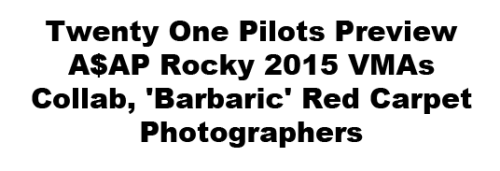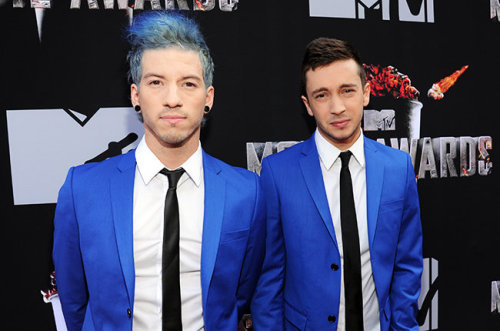secretlyblurryface: fuckyeahtwentyonepilots: “I was shocked that so many people pointed at somethi
secretlyblurryface: fuckyeahtwentyonepilots: “I was shocked that so many people pointed at something I created on my own, in my basement, by myself, and said, ‘That’s bad.’ How can you say that?” Twenty One Pilots are a little more than 48 hours away from their nationally-televised MTV Video Music Awards performance with A$AP Rocky. They still haven’t met. Chatting with Billboard yesterday (Aug. 28) at around 11 a.m. Los Angeles time, vocalist-songwriter Tyler Joseph is cautiously optimistic. He’s more nervous for today (Aug. 29)’s first-time rehearsal with Rocky, because he knows it will make or break their performance, which MTV has left curiously open-ended. A little more than a week ago, they didn’t even know they were performing. The Ohio-based duo of Joseph and drummer Josh Dun isn’t exactly a rock band, but its left-of-center combination of rock, rap and dance music makes them the lone representatives of what you might call “alternative” at this year’s VMAs, alongside megastars like Miley Cyrus and Kanye West. What’s it like to be such an outsider at the VMAs? Joseph took us behind the curtain. Describe your talks so far with A$AP Rocky and MTV. What’s your performance going to be like? I never have met Rocky before but from talking to him on the phone, we’re pretty like-minded, as far as being performance-focused. We’re talking about how we’re living in times where our fanbases and audiences get to decide which songs rise up, maybe become a single … We’re going to go into rehearsal and talk about what songs we like most off the records we just released, which ones are resonating with fans. We’re looking at it from more of a performance space, rather than pushing singles. I had a few conference calls with MTV. They said, “This is what we’re looking for. We’re looking for a certain type of energy.” They want Rocky and I to be a part of the performance from top to bottom. That’s cool, because a lot of times with these collaborations, you might only bring a person out for a verse. I don’t know exactly what songs we'e performing, but I’ve got a lot of ideas on my laptop, like transitions. When you work with live television you have a very strict time schedule; we have to fit this in three minutes and 30 seconds. Is there anyone you’re especially looking forward to meeting at the VMA’s? It’s not really my thing, and maybe this stems from an insecurity that nobody knows who we are. Josh is the guy in the band who’s just so friendly and super wanting to walk up to you and say, “Hey, I’m Josh. I drum in this band and I’m a big fan of you and I really appreciate what you do.” Josh has all these great friends in the industry now. I’ve always sat back and let him be the icebreaker and then I’ll maybe say, “Hey, I’m the other guy!” You’ve done red carpets before. What are they like? It’s just a very weird concept. You have someone assigned to you that holds a sign of your name in front and then all these cameramen take a picture of that sign so that when they’re flipping through pictures of the night, they can see which person they’re taking a picture of. It feels like some sort of weird dog and pony show. They just kind of drag you along to the next person and then people take a picture of you. The photographers are trying to prompt you and get you to react. They’ll yell things about what you’re wearing, about it being not cool or stupid, so that you look over at them and get mad and they get the right shot. It’s barbaric. I just wanted to leave. I’m a little more prepared this time because I know what it consists of, but in no way am I looking forward to that part of the night. Do you remember specific insults they said to you guys? I think like, “Nice tight pants,” or something … Something about my pants. But there are a lot of people wearing tight pants! Yeah, well that’s one of their go-tos for offending people that they’re taking pictures of. What are some wacky questions you’ve been asked by reporters at red carpets? One of the more awkward dynamics of an event like that is that you’re being interviewed by someone who doesn’t just not know who you are, but doesn’t really care who you are, either. So they’re asking you a simple question like, “When did you guys meet?” or “What does your band name mean?” And they’re not even looking at you when you’re talking; they’re looking around to see who else is walking by to snag. As you’re talking to them or as you’re answering a question, they will just dip and go start talking to someone else who’s more important. It really makes you feel terrible. The more I’m talking to you about it, the more I’m not looking forward to that part at all. Tell me about seat fillers. They’re another odd part of the award show experience. So they don’t want any of the seats to seem empty on television – if a main star that’s sitting in the front row wants to get up and go to the bathroom and they happen to be coming out of a commercial break, [they] have all these seat fillers. They’re people dressed really nice, just lined up outside. They have people coordinating: “Okay, Mark Wahlberg stood up and left. Bring someone who kind of looks like him or just bring a good looking guy and have him sit in this spot.” It’s this really odd exchange of people. My goal this time around is to look where I’m sitting and try to see who it is they replace me with, try to see who it is they think I look like. It’s a weird out-of-body experience; I’m going to be performing for myself, so I’m going to be looking forward to that. What was it like performing “Car Radio” at the 2014 MTV Movie Awards? I just look out from my piano and block everything out to perform in front of that many people. It’d be really cool for my answer to you to be like, “It’s no big deal. It’s just another show. This is what I do, man.” And seem like I’m this really confident, nail-it-every-time type of guy. But being honest with you, it was one of the bigger rushes I’ve ever felt. When you play a show or festival, people know what they’re getting; they want it. Then you’re thrown onto a show where people are watching TV in their houses and whether they ask for it or not, we’re being played in front of them. There’s a lot of negative feedback. I was shocked that so many people pointed at something I created on my own, in my basement, by myself, and said, “That’s bad.” How can you say that? You don’t even know what I’m saying or how much this music has helped me and maybe other people. After that, whenever I look at an artistic performance, I want my response to be, “I don’t like that” instead of “I think that’s bad.” It’s art. It can’t be “bad.” It’s all relative. - Billboard This resonates so hard and explains why he looked so bored there. He understands the positives of it for himself but damn the politics of that all must be so bad. -- source link
Tumblr Blog : fuckyeahtwentyonepilots.tumblr.com

